Kevin Clarke
Operetta Research Center
31 August, 2019
In August 2019, Northern Ireland Opera presents an Offenbach Bicentenary Festival. The choice of shows for this festival is remarkable, because it’s far removed from the usual standard pieces performed elsewhere: The Island of Tulipatan (1868) and Daphnis and Chloé (1860). We spoke with Judith Wiemers who initiated this Offenbach project and who has been dramaturg at Northern Ireland Opera since 2017; she’s also head of the studio program.
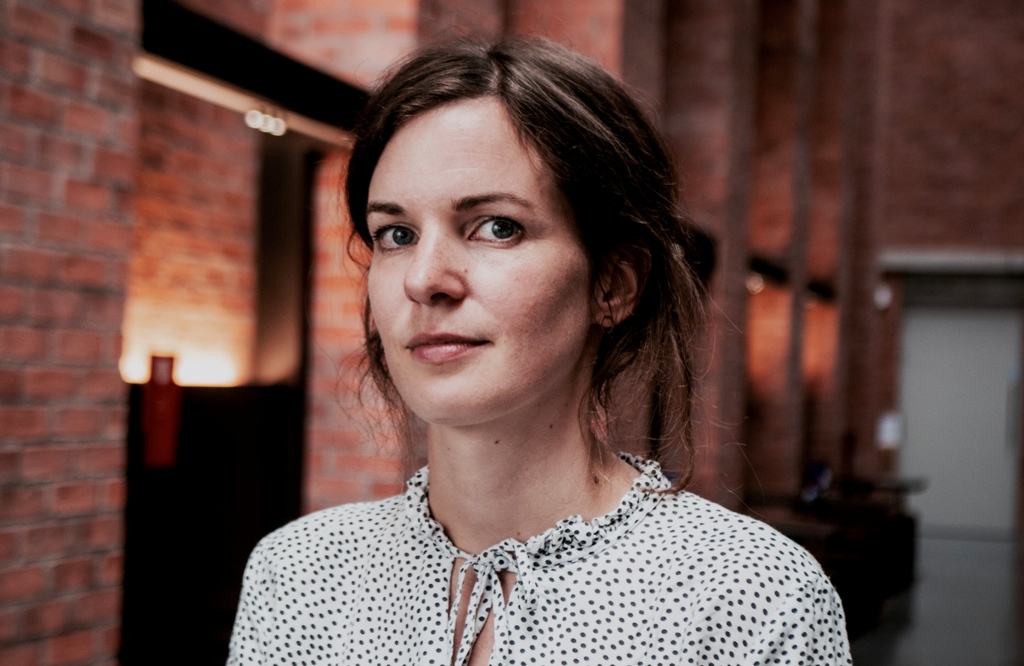
Dramaturg Judith Wiemers, head of Opera Northern Ireland Studio. (Photo: Private)
You’ll present operetta in Northern Ireland. Is there any noteworthy operetta tradition there, in general or with regard to Offenbach in particular?
Since the Grand Opera House opened in Belfast in 1895, it seems to have confidently presented a mix of popular pieces, core opera repertoire, and even circus shows. Especially during Belfast’s affluent years in the late 19th and early 20th century, both visiting and local opera companies regularly brought musical comedies and operettas to the venue. These included, of course, The Merry Widow in 1909, The Mikado, and some other pieces that did well on the West End, such as Ivan Caryll’s Shop Girl and Sidney Jones’ hit show The Geisha.
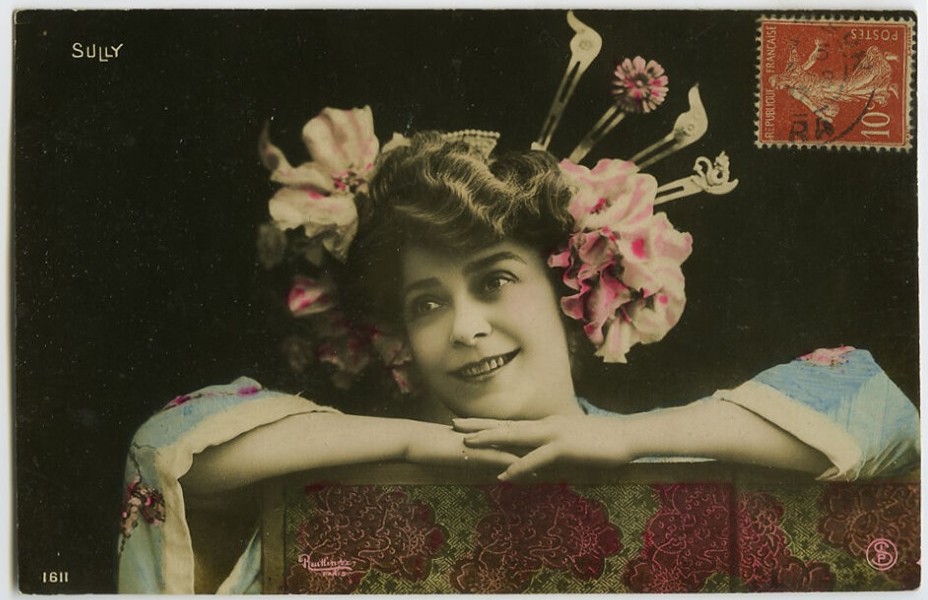
A historical postcard showing Mariette Sully in a production of “The Geisha.” (Photo: Kurt Gänzl Archive)
In the 20s and 30s, Belfast audiences could enjoy big international successes such as The Student Prince, Rose Marie or No, No, Nanette, and in 1934, Erik Charell’s production of White Horse Inn was brought over from The London Coliseum. A few Offenbach pieces were indeed performed in Belfast, such as Robinson Crusoe, and La Vie Parisienne!
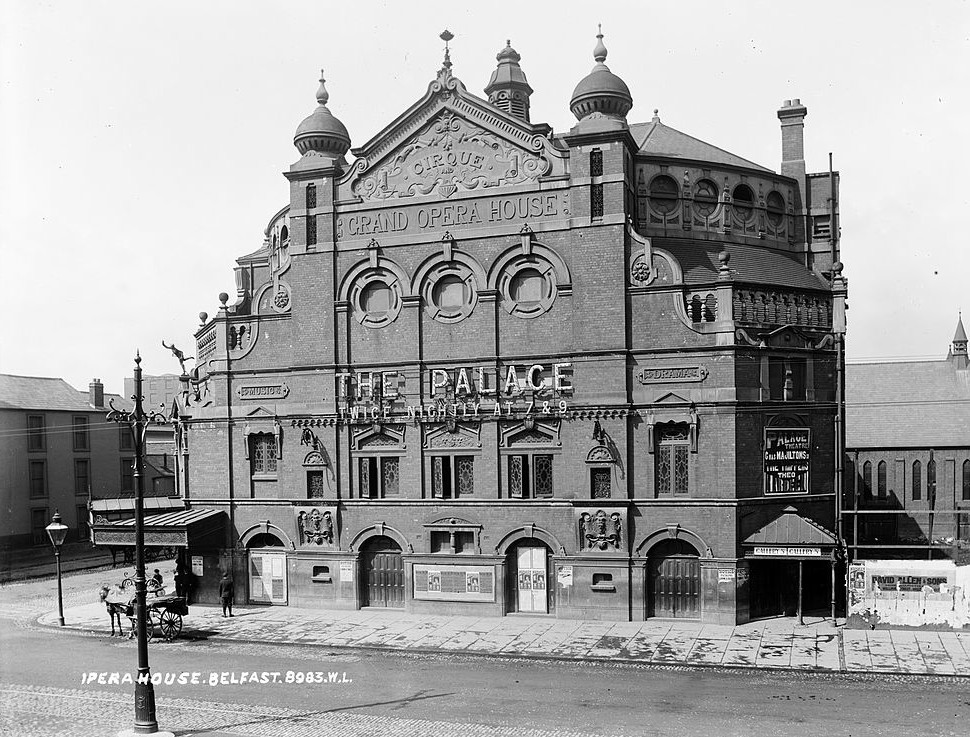
The Belfast Grand Opera House, in 1910. (Photo: National Library of Ireland)
As far as I am aware, however, Northern Ireland has never had a strong tradition of producing (or composing!) operetta. One notable exception is maybe the world premiere of the Charles Lecocq piece The Lady and the Maid (1864), arranged by Northern Irish composer Havelock Nelson, in 1957.
During the Troubles, the Opera House was bombed and fell into disrepair. The city has come a long way since the Good Friday Agreement in 1998, but there has been very little activity in the way of professional, or even good amateur/experimental operetta.
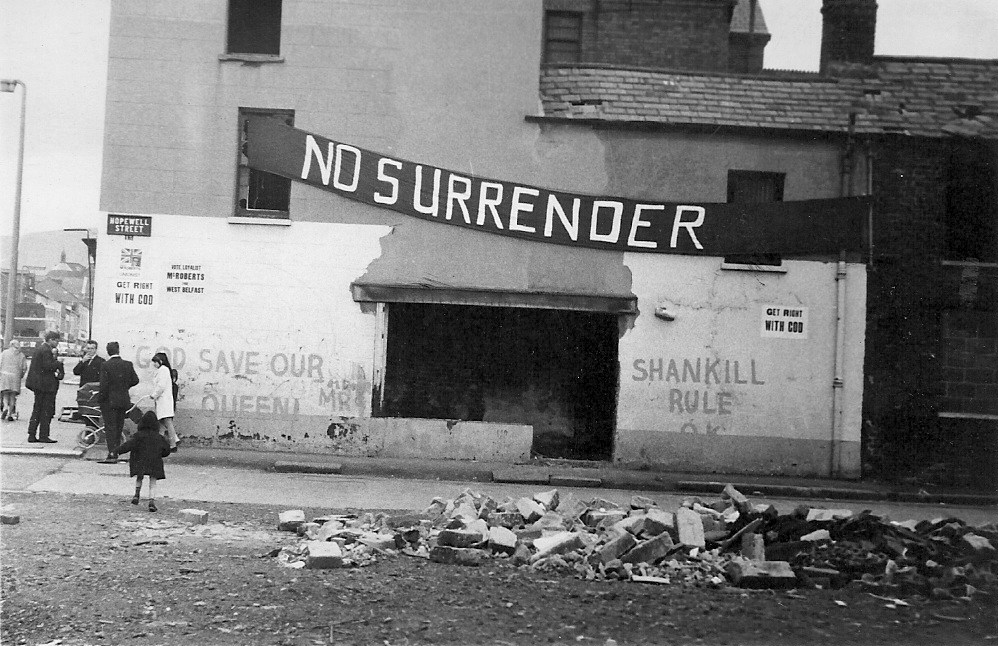
The Shankill Road, Belfast, during the troubles in 1970. (Photo: Fribbler/Wikipedia)
What are the reactions you’ve had to operetta so far in Northern Ireland? What’s the music your audience was brought up on, how does that relate to Offenbach?
Northern Ireland Opera was founded in 2010, and with the exception of Offenbach’s Orphée in its second season, the company has stayed clear from operetta. With the arrival of the company’s new artistic director Walter Sutcliffe, who had primarily worked in Germany up to that point, the outlook on repertoire changed quite dramatically.

Dawn Burns in the NI Opera Studio production of the revue “Midnight Vanities.” (Photo: Northern Ireland Opera)
In the last two years, we have presented The Threepenny Opera and Sweeney Todd, both with a cast that combined opera professionals and musical theatre performers. The NI Opera Studio – the company’s development programme for young, upcoming opera singers – was subsequently designed to complement the main-stage programme with experimental, low-budget, and highly flexible touring shows. As part of the Studio programme we have, for example, performed a revue entitled Midnight Vanities, with songs by Paul Abraham, Werner Richard Heymann, Eduard Künneke, Friedrich Hollaender, Franz Lehár and Kurt Weill. The evening also included two numbers that I was a little nervous about.
Firstly, this was Oscar Straus’ naughty “Jazz up your lingerie”, which he wrote for a Hollywood production of his 1907 operetta Ein Walzertraum (released as The Smiling Lieutenant in 1931). And Hanns Eisler’s truly spine-chilling “Abortion is illegal” with lyrics by Bertolt Brecht.
To present these two songs in a country that still has not legalised abortion and is co-governed by an ultra-conservative party felt like a small act of rebellion. Both our cast, who encountered this repertoire for the first time, and the audience enjoyed the evening hugely. When we brought the show to a tiny venue in Derry/Londonderry, a city close to the Irish border that has seen some of the worst violence during the civil war, people spontaneously cheered during the “Abortion” number. Here in Northern Ireland, especially, this music still seems incredibly fresh and modern. I could speculate that the incredibly powerful popular music associated with the late Weimar Republic touches a nerve in a region that is still recovering from the trauma of the Troubles, with many of its old conflicts still bubbling under the surface somewhere. This place still struggles to find its identity, to overcome old divisions, and rejuvenate itself.

The Belfast Grand Opera House today. (Photo: Albert Bridge/Wikipedia)
The decision to realise two Offenbach one-act operettas with the Studio this year came quite easily. Firstly, it made sense for the obvious, somewhat pragmatic reason that we are celebrating the composer’s bicentenary this year. Secondly, the musical demands of the pieces we have chosen are – I hope – manageable for young performers. The company is also currently preparing for a main-stage show of Die Fledermaus (in a brand new English translation by Meredith Oakes), which provides a nice link. Most importantly, however, I felt that Offenbach’s short operettas would offer our young singers a perfect opportunity to experiment with performance practices in a very informal environment. The elements of grotesque and frivolity, so deeply embedded in this genre, challenge singers that are fresh out of college and used to very earnest renditions of bel canto arias (a skill I in no way would like to disparage!).

The “Tulipatan” cast rehearsing the operetta finale. (Photo: Northern Ireland Opera)
You decided on two relatively unknown one act pieces – not the typical “standards”. Why? And why these two?
In the NI Opera Studio, we usually try to find pieces that our audiences (and singers!) have not heard/seen before. We recently produced a farce by Domenico Scarlatti (La Dirindina), which actually bears some operetta trademarks in its self-deprecating irony, its satirical remarks about self-proclaimed authorities and openness about human desires. Regarding Offenbach, I was particularly keen to include Tulipatan. I have been absolutely astonished by how modern this piece is in the claims it makes about gender as a social construct. If we make ourselves aware that this idea was only fully established and theorised in the late 20th century, we must acknowledge the progressiveness of the librettists (Henri Chivot and Alfred Duru) and composer as truly extraordinary. The work pre-empts many discussions about the differences between ‘sex’ and ‘gender,’ fluid gender identities and non-cis that we are still having today. I believe that these discussions should take place in a public arena a lot more often, as far away from the closet as possible, so to speak.

Sheet music cover for the quadrille of Offenbach’s “L’Île de Tulipatan.”
The unashamed flamboyance of Tulipatan is coupled with Daphnis and Chloé; a piece that disguises itself as a bucolic tale of innocent love, but is anything but (libretto by Clairville and Jules Cordier). We encounter two young people who are hopelessly attracted to each other, but in an age where virtual exchanges of both sentimental and sexual nature have to some extent replaced real ones, they have difficulties putting their intentions into practice. Thankfully, help is at hand from some more experienced characters. As in the other Offenbach pieces using protagonists from Greek mythology, the composer and his librettists are holding up a mirror to our very society and its most mundane struggles. Daphnis and Chloé openly questions the usefulness of monogamy as the highest principle in love relationships. That’s quite bold – and timeless!

The Albany Records release of Offenbach’s “The Island of Tulipatan,” 2017.
Tulipatan has seen an interesting revival in English productions recently, probably because of its very up to date way of deconstructing gender roles and toying with the idea of same sex marriage. How open are Northern Irish audiences (or society) for this, when the ruling conservative party has so far prevented marriage equality?
It is an interesting time in Northern Ireland. Only two weeks ago, MPs overwhelmingly voted to extend the UK’s equal marriage bill to Northern Ireland, and if the Northern Irish government is not reinstalled by mid-October (we have been without an executive for over two years), the new law will be introduced. Let’s keep our fingers crossed that we will have equality at last. I think society here is ready for it. This and next week, the city celebrates Belfast Pride, with dozens of events dotted around city centre and a parade to top it all off. While there is still a hard-core conservative minority upholding the belief that same-sex relationships are condemnable, these extreme views are not typically harboured by the general public – at least that is my impression. I am positive that our audiences will endorse the ethos of Tulipatan and its celebration of love in all its shapes and sizes. You may have noticed the subtitle we chose: “An island just like this.” I would like to argue that the “madness” in Tulipatan is ultimately completely normal, and all around us!
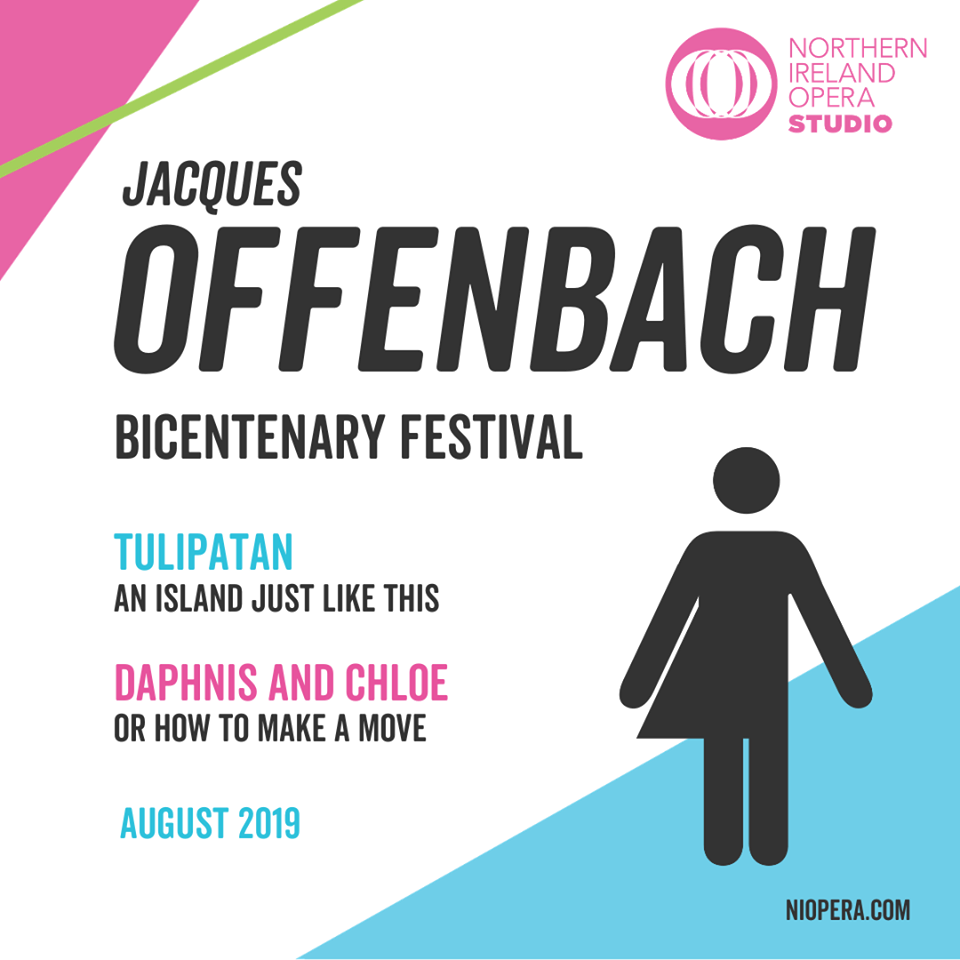
Poster for Northern Ireland Opera’s “Offenbach Bicentenary Festival,” 2019.
Are the debates about operetta and gender, feminism, racism, Nazi politics etc. heard of in Ireland? And do you see a chance for winning new audiences with them?
To be honest, I don’t think that many people in Ireland would be aware of the current discussions. I assume you are alluding to Land des Lächelns (Land of Smiles), which has seen some very insensitive productions in the German-speaking theatre scene lately. The Irish opera scene is currently very active and has a lot to discover about operetta. This is a country madly in love with musical theatre; the number of amateur groups realising quite ambitious productions is surprising given the small population. I really hope that some of the main players find a way into the treasure chest of operetta repertoire. I am sure there is huge potential for winning new audiences, especially at a time when Ireland feels positively ‘in motion’ regarding social issues such as those mentioned in your question. Did you know that a group called The Dublin Musical Society did Viktoria and her Hussar in the 1940s? I would love to find out more about it!
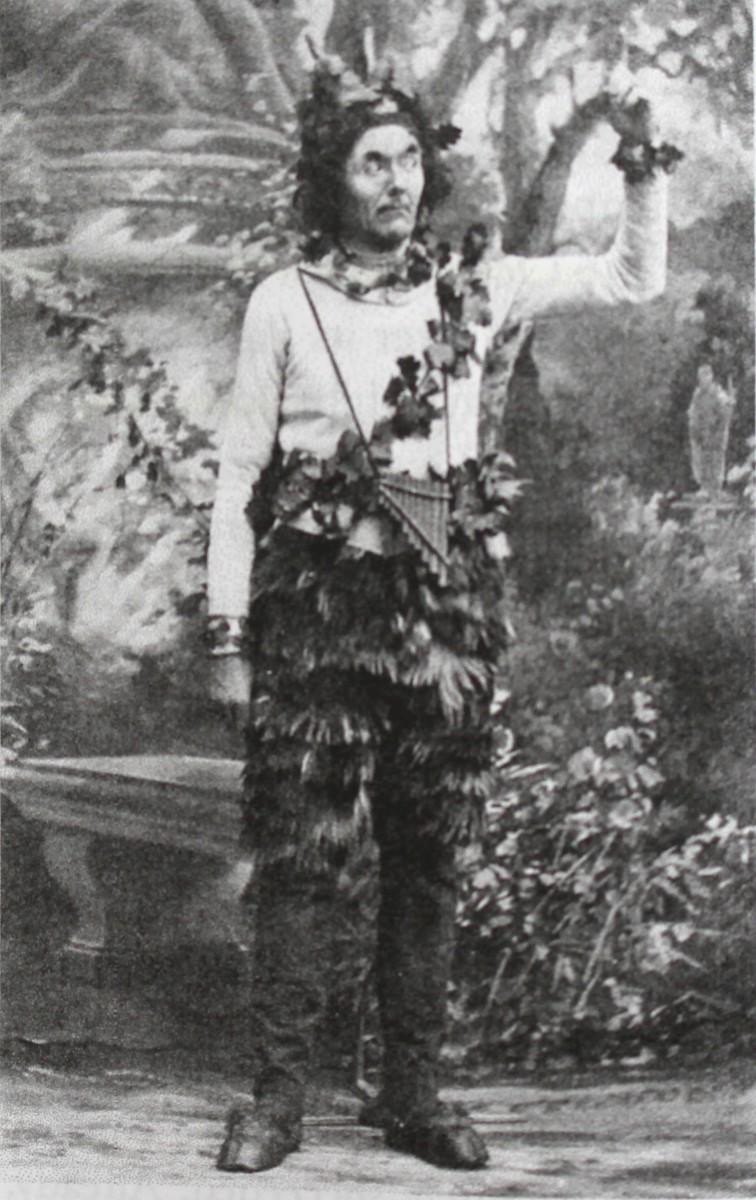
Famous Austrian playwrite Johannes Nestroy as God Pan in Offenbach’s “Daphnis und Chloe” in Vienna. (From: Laurence Senelick, “Jacques Offenbach and the Making of Modern Culture,” 2018)
While Tulipatan is a gender romp, Daphnis is in essence a sex farce. How do you plan to sell this?
In many ways, the modest scale of these NI Opera Studio productions is a blessing in disguise. We can do these more experimental pieces exactly because we have tighter budgets and smaller audiences, and all productions are essentially low-risk. Didn’t Offenbach say that it was the duty of the smaller companies and theatres to rejuvenate musical comedy? That’s essentially what we are trying to do. We are always as ambitious as possible, both with regards to production values and casting, and we design these shows with a diverse audience in mind. In the past, we had people with no opera experience sitting next to our very core opera audience: accessibility is what it is all about. We have translated the French dialogues of both pieces into English with nods both to the original and to contemporary life in Northern Ireland. Hopefully, the choice of venues will also assist with our approach. We will, amongst others, perform at our venue partner The Black Box – a very cool, low-key, informal space supporting arts of all genres. At another Belfast venue, the Cabaret Supper Club, the audience have dinner and enjoy the show amidst the lushest Variety theatre surroundings you can imagine!
Are there equivalents to Tulipatan in Irish popular culture, e.g. Mrs. Brown’s Boys with its cross dressed leading lady?
If you know Mrs. Brown, you may also be aware of May McFettridge. May is a comedy performer in cross-dress, and she has been a household name in Northern Irish entertainment for several decades.
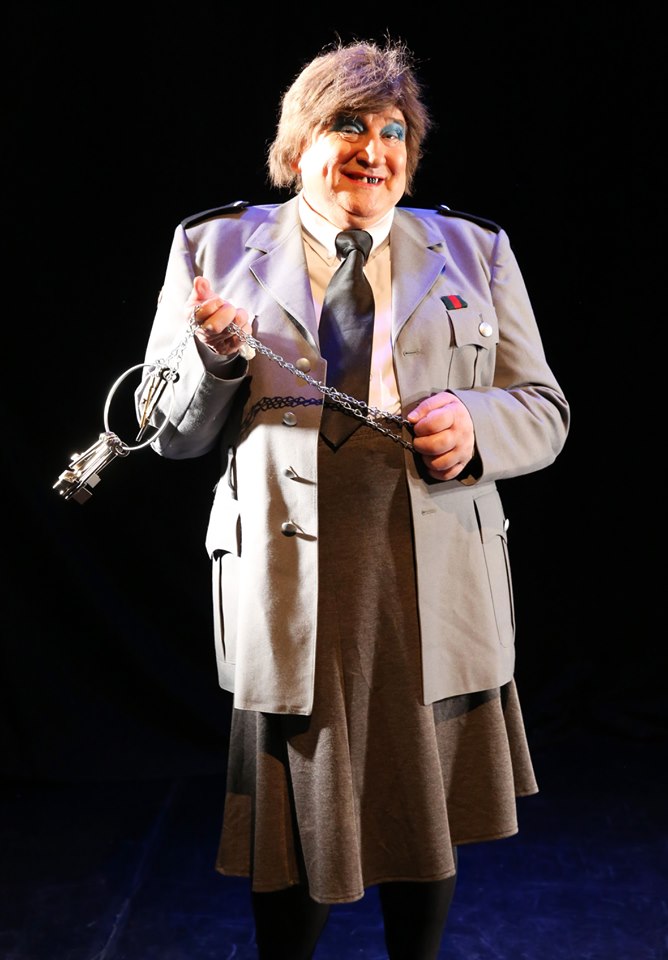
John Linehan as his alter ego May McFettridge in his role as Frosch in Northern Ireland Opera’s production of “Die Fledermaus” at The Grand Opera House, Belfast with the Ulster Orchestra, 2019. (Photo: Northern Ireland Opera)
She will actually perform the role of Frosch the jailer in our upcoming production of Die Fledermaus at the Grand Opera House! There are of course some interesting entertainers in the younger generation also.
Who are your singers: typical opera people or from the musical comedy world?
Most importantly, all our singers are very young. Many of them are straight out of college or have only a few years of professional stage experience. Working with a young cast is extremely rewarding; they are happy to throw themselves at unknown repertoire and enjoy experimentation. Usually, the members of the NI Opera Studio are trained opera singers, but many of them have sung musical theatre too. For the Offenbach, I felt it was important to honour the genre’s roots in 19th-century Parisian salon entertainment. As our king Cacatois, audiences will therefore have the pleasure to see and hear cabaret artist and singer Matthew Cavan. Matt has developed quite a reputation for his drag act Cherrie On Top, and has established himself as a very talented actor and singer of predominantly musical theatre repertoire.

Soprano Elaine McDaid and tenor William Blake rehearse a duet in “Tulipatan.” (Photo: Northern Ireland Opera)
In the past, NI Opera cast him as Mrs Peachum in Threepenny Opera, for example. Personally, I think combining talent from a variety of genres is the most exciting way to stage operettas and musical comedies. Offenbach’s works contain so many facets of comedy – it would be a shame to miss these through uninspired casting. I think I need to delve a bit deeper into the Offenbach recording history, but I can say that to me, recordings of operettas by opera singers who sing Leo Fall or Oscar Straus just as they sing Puccini can sound a little anodyne. This is, of course, a question of personal taste.
Are the operetta performances in Belfast a serious competition to other English language places such as Ohio Light Opera or Chicago Folks Opera? Do you (and your cast) follow what’s going on there? What’s your verdict?
Probably not yet. The Studio enterprise is still very young in its current format – less than two years in fact. We hope to build it up further and develop a very distinct brand so that hopefully in the future, we can see eye to eye with the companies you mention. It would be interesting to find out how a larger Northern Irish audience might react to a main-stage production of, say, an Abraham piece. It was encouraging to see how well-received our Threepenny Opera was!

Current NI Opera Studio member Elaine McDaid will perform the role of Alexis (“Tulipatan”). Here she is seen in the NI Opera Studio production of “If you can find me – an evening with songs by Stephen Sondheim.” (Photo: Northern Ireland Opera)
Would you say it’s a blessing, in the end, to have “no tradition” and start afresh? Instead of having these painful processes as in Mörbisch, Ischl or Vienna?
Absolutely, I think this is key! We are not weighted down by performance traditions and specific expectations audiences might have about any given piece. Especially in the Studio productions, this enables us to approach our repertoire without false respect, which is important for the performers, the creative teams and audiences alike. So far, it seems that people have been very open to our interpretations, and I sincerely hope that we will get plenty of curious punters to join us for the Offenbach extravaganza!

The Festival directors: Katharina Kastening (“Daphnis and Chloé”) and Conor Hanratty (“Tulipatan”). (Photo: Northern Ireland Opera)
Will there be a live stream of the performances? Will you bring the productions elsewhere, e.g. the Staatsoperette Dresden which is seeking to rejuvenate itself?
Alas, neither, I am afraid, but you never know what the future brings!
For more information and performance dates, click here.
